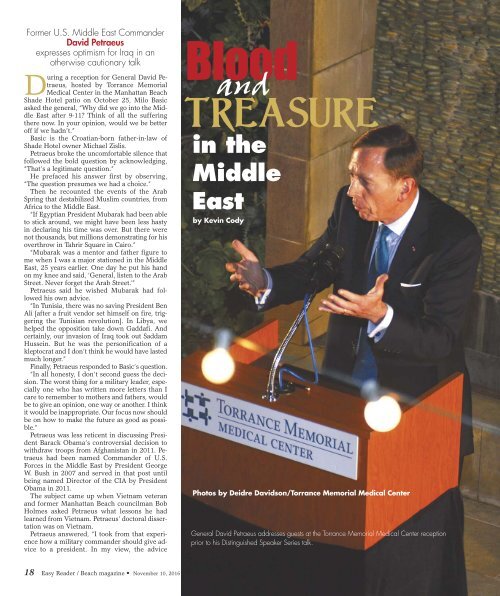Beach Nov 2016
Create successful ePaper yourself
Turn your PDF publications into a flip-book with our unique Google optimized e-Paper software.
Former U.S. Middle East Commander<br />
David Petraeus<br />
expresses optimism for Iraq in an<br />
otherwise cautionary talk<br />
During a reception for General David Petraeus,<br />
hosted by Torrance Memorial<br />
Medical Center in the Manhattan <strong>Beach</strong><br />
Shade Hotel patio on October 25, Milo Basic<br />
asked the general, “Why did we go into the Middle<br />
East after 9-11? Think of all the suffering<br />
there now. In your opinion, would we be better<br />
off if we hadn’t.”<br />
Basic is the Croatian-born father-in-law of<br />
Shade Hotel owner Michael Zislis.<br />
Petraeus broke the uncomfortable silence that<br />
followed the bold question by acknowledging,<br />
“That’s a legitimate question.”<br />
He prefaced his answer first by observing,<br />
“The question presumes we had a choice.”<br />
Then he recounted the events of the Arab<br />
Spring that destabilized Muslim countries, from<br />
Africa to the Middle East.<br />
“If Egyptian President Mubarak had been able<br />
to stick around, we might have been less hasty<br />
in declaring his time was over. But there were<br />
not thousands, but millions demonstrating for his<br />
overthrow in Tahrir Square in Cairo.”<br />
“Mubarak was a mentor and father figure to<br />
me when I was a major stationed in the Middle<br />
East, 25 years earlier. One day he put his hand<br />
on my knee and said, ‘General, listen to the Arab<br />
Street. Never forget the Arab Street.’”<br />
Petraeus said he wished Mubarak had followed<br />
his own advice.<br />
“In Tunisia, there was no saving President Ben<br />
Ali [after a fruit vendor set himself on fire, triggering<br />
the Tunisian revolution]. In Libya, we<br />
helped the opposition take down Gaddafi. And<br />
certainly, our invasion of Iraq took out Saddam<br />
Hussein. But he was the personification of a<br />
kleptocrat and I don’t think he would have lasted<br />
much longer.”<br />
Finally, Petraeus responded to Basic’s question.<br />
“In all honesty, I don’t second guess the decision.<br />
The worst thing for a military leader, especially<br />
one who has written more letters than I<br />
care to remember to mothers and fathers, would<br />
be to give an opinion, one way or another. I think<br />
it would be inappropriate. Our focus now should<br />
be on how to make the future as good as possible.”<br />
Petraeus was less reticent in discussing President<br />
Barack Obama’s controversial decision to<br />
withdraw troops from Afghanistan in 2011. Petraeus<br />
had been named Commander of U.S.<br />
Forces in the Middle East by President George<br />
W. Bush in 2007 and served in that post until<br />
being named Director of the CIA by President<br />
Obama in 2011.<br />
The subject came up when Vietnam veteran<br />
and former Manhattan <strong>Beach</strong> councilman Bob<br />
Holmes asked Petraeus what lessons he had<br />
learned from Vietnam. Petraeus’ doctoral dissertation<br />
was on Vietnam.<br />
Petraeus answered, “I took from that experience<br />
how a military commander should give advice<br />
to a president. In my view, the advice<br />
Blood<br />
and<br />
treasure<br />
in the<br />
Middle<br />
East<br />
by Kevin Cody<br />
Photos by Deidre Davidson/Torrance Memorial Medical Center<br />
General David Petraeus addresses guests at the Torrance Memorial Medical Center reception<br />
prior to his Distinguished Speaker Series talk.<br />
18 Easy Reader / <strong>Beach</strong> magazine • <strong>Nov</strong>ember 10, <strong>2016</strong>

















